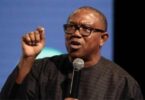The First Lady of Nigeria, Senator Oluremi Tinubu on Thursday in New York received Nigeria’s Sustainable Development Goals (SDG) 16 2022 Shadow Report put together by the Civil Society Legislative Advocacy Centre (CISLAC).
The presentation came at the official launch of the report at the Salvation Army Auditorium, International Justice Commission on the sidelines of the 78th session of the United Nations General Assembly (UNGA) in New York.
It was presented by the Executive Director of CISLAC, Auwal Ibrahim Musa Rafsanjani, who explained that it was the 6th edition in the series of annual shadow reports which measure Nigeria’s progress on SDG 16 specifically targeting 16.4 dealing with anti-money laundering; 16.5 which looks at beneficial ownership and 16.10 which looks at access to information.
He said this year’s report notes an improvement in two indicators including improvement in the policy area of Beneficial Ownership.
The CISLAC boss regretted the existing high level of corruption, which he said is reflected in the 2022 Corruption Perception Index (CPI) released globally by Transparency International where Nigeria scored 24 out of 100 points.
He added; “Sadly, we need to do more as a nation to ensure that this trend doesn’t continue. As we all know, in the just concluded election, anti-corruption was not a major issue agenda when compared to previous elections and this is disturbing.
“Already, we have seen leadership appointment given to persons who have been fingered in corrupt acts nationally and internationally and this is very sad because it sends a wrong signal to the international community.”
While calling for independence of institutions, CISLAC stressed the need for the principle of separation of powers as stipulated in the Nigerian constitution to be respected.
He stated: “Court rulings should be respected and where individuals, government entities or other arms of government disagree, they should seek redress through constitutional means.
“This independence should also extend to the anti-graft agencies from their budgetary allocations to their appointment and removal of their heads. Due process should be followed always.”
Rafsanjani noted the insecurity across the country as another challenge to Nigeria’s attainment of the SDG targets, saying: “This has resulted in Nigeria’s failure to meet its oil production output target given by the Organization of Petroleum Exporting Countries (OPEC), thereby creating revenue shortage for Nigeria.
“Nigeria’s challenge in revenue generation and the absence of prudent resource mismanagement has led to an enormous increase in borrowing which has resulted in a surge in national debt.
“The continuous appetite for luxurious items like vehicles by political office holders doesn’t help matters. Nigeria’s total public debt hit N87.38 trillion at the end of the second quarter of 2023 according to Nigeria’s Debt Management Office and this is not sustainable.
“The last factor which poses a bottleneck on tangible progress is the actions of the government against the domestication by States and effective use of the Freedom of Information (FOI) Act freedom of speech and freedom of the press. As at May 2023, official data has stated that only 20 States out of the 36 States have domesticated the FOI in Nigeria (16 States are yet to domesticate the Act).
“This is one of the mechanisms that serves to promote transparency and accountability in government giving citizens access to information and enhancing their capacity to demand accountability.”
CISLAC posited that achieving the SDGs will become most challenging where there is no solution to the identified challenges.
He expressed the hope that the recommendations in the report would be followed through by the appropriate authorities to guarantee the protection of the lives and freedom of Nigerians as well as reduce corruption within the government.
. TheWitness







